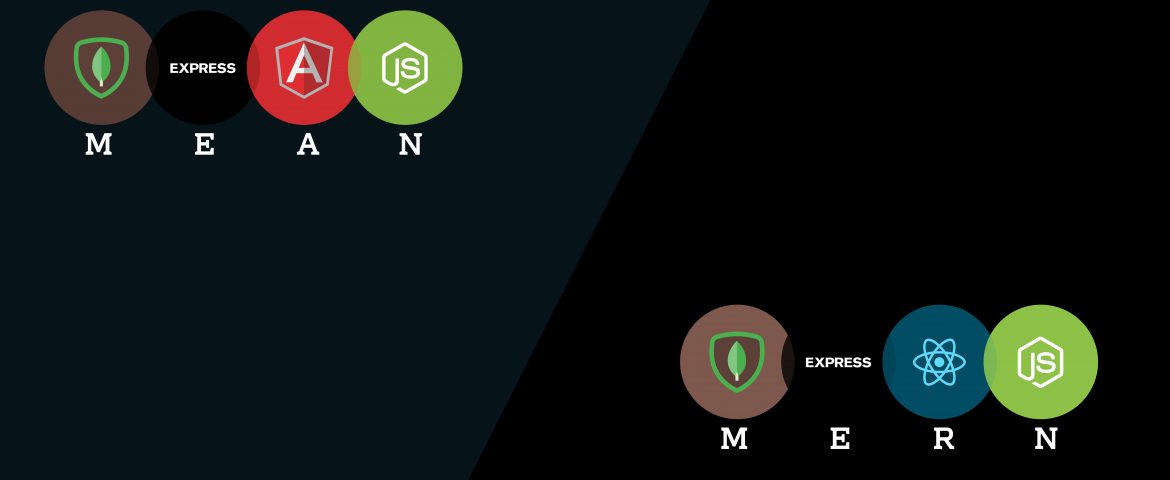
MEAN vs. MERN, which one to choose? One thing to understand is that both MEAN and MERN are full-stack frameworks. They both incorporate Java-coded components. The principal difference is that MEAN adopts Angular JS whereas MERN implements React JS. Developers can use either of these stacks to create a reactive and intuitive User Interface. In order to track which stack is better than the other, we need to understand the underlying differences between them.
This being a constantly running comparison we got down to groundwork on finding out the same to ease your search. When it comes to building a career in Full-Stack Web Development, there are a plethora of frameworks and programs to choose from.
However, picking the right technology among the MEAN & MERN stack can help you in developing the kind of projects that you are envisioning to create.
Knowing the power of each stack can help you build better projects. In this article, we’ll be sharing what the industries demand primarily from developers concerning MEAN & MERN. This report is based on data collected by GUVI’s Recruitment Team.
Table of contents
- MEAN vs MERN
- What is MEAN Stack Development?
- Key Takeaways for MEAN Stack Developers
- What is MERN Stack Development?
- Key Takeaways for MERN Stack Developers
- MEAN vs. MERN: Essentially, React vs. Angular.
- Simplicity, Ease of learning
- Longevity & New Updates
- MEAN vs MERN: Career Growth & Future Trajectory
- MEAN vs MERN: Who Should Choose What?
- Developers and coding enthusiasts
- Engineering Graduates:
- New to coding and non-programmers
- MEAN vs MERN: How long does it take to learn?
- Wrapping Up on MEAN vs. MERN
MEAN vs MERN
The two most popular technology stacks are MEAN and MERN. Before going ahead with either of these, it is important to understand what each one entails. Knowing the suitability and applicability will help you select the most appropriate stack development course to boost your portfolio and enhance your skills.
Let us quickly run through the basics of what you need to know about MERN vs. MEAN Stack Development.
What is MEAN Stack Development?
MEAN is an abbreviation for
MongoDB,
Express.js,
Angular, and
Node.js.

- It is a full technology stack. And, all types of applications can be developed easily.
- Essentially, programmers use it to develop web-based applications.
- Being compatible with various plug-ins and widgets, the MEAN stack comes in handy for development that is tightly time-bound.
- MEAN stack is widely used to develop hybrid mobile applications, as compared to native apps.
- This open-source stack technology is JavaScript-based and so has huge community support.
- The wide range of built-in tools eases the production process.
- The use of a single language for back-end and front-end imbibes increased coordination, implying faster response time in applications.
Key Takeaways for MEAN Stack Developers
MEAN stack developers have the advantage of working with an abundance of compatible tools and useful plugins. These tools optimize time for system administration purposes. It is a powerful stack. It also enables developers to deploy applications rapidly. This aids them in solving complex development challenges. It is one of the most popular and among the fastest-growing open-source development frameworks with wide applicability and demand.
If you wish to enhance your skills in full-stack development, MEAN stack is one way to go. MEAN stack developers are now hired by software companies because they are equipped with the skills and knowledge to build a website or mobile app from scratch quickly.
They are capable of ensuring that the apps are developed in a short duration and are lightweight. MEAN Stack Development is ideal for tech enthusiasts trying to build their careers in the startup sector. And its unique and flexible offerings ensure high salaries ranging between INR 5 – 8 LPA, according to the GUVI Hiring Team.
What is MERN Stack Development?
MERN stack is relatively newer and is gained a lot of traction and popularity in the past few years. Unlike MEAN stack development, MERN stack development is primarily used to design top-end web apps. MERN is short for

MongoDB
Express.js
React
Node.js.
- It is an open-source technology stack that is a collection of JavaScript-based databases, runtime environments, and frameworks.
- It offers an end-to-end framework for developers and hence is growing popular day by day.
- Both front-end and back-end development can be built by a single coding script.
- The entire process can be completed using only JAVA and JSON.
- The MVC architecture helps in error-free development.
- The wide range of built-in tools eases the production process with real-time testing.
Key Takeaways for MERN Stack Developers
If you wish to enhance your skills in full-stack development, MERN stack is the way to go. Software companies equally present their interest in MERN stack developers, like the MEAN stack developers, for more or less the same reasons. In the same vein, its unique and flexible offerings ensure a high salary of up to INR 6-21 LPA, according to the GUVI Hiring Team.
Before diving into the next section, ensure you’re solid on full-stack development essentials like front-end frameworks, back-end technologies, and database management. If you are looking for a detailed Full Stack Development career program, you can join GUVI’s Full Stack Development Course with placement assistance. You will be able to master the MERN stack (MongoDB, Express.js, React, Node.js) and build real-life projects.
Instead, if you would like to explore JavaScript through a Self-paced course, try GUVI’s JavaScript certification course.
MEAN vs. MERN: Essentially, React vs. Angular.
MEAN vs MERN! A skill report by HackerRank Developer in 2018, 30% of programmers desired to learn to React. That is to say, React is earning more prevalence lately. Furthermore, 35.9% of developers prefer to develop using React.
According to the report, we can trace that React appears to be slightly more popular. It implies that MERN is in the lead as per the survey.
Let us dive deep into the discussion and find out which is better for your project: MEAN vs. MERN, there are so many factors to consider, starting with:
Simplicity, Ease of learning
The React framework is what sets the MERN stack apart from the MEAN stack’s Angular one, as React uses a full-fledged programming language to construct conditional or repetitive elements with a language that has no templates. This is one of the reasons why budding developers choose MERN stack development. They don’t have to learn a whole new language as it is built using JavaScript. Javascript is the most popular and extensively used programming language.
Longevity & New Updates
In the long run, it has been found that React does a better job than Angular, simply because it is extensively used, constantly evolves and remains relevant. It is also one step ahead of Angular because of its virtual DOM implementations, as well as rendering optimizations. Unlike Angular, updates don’t have to be installed one by one, and it provides developers with a myriad of existing solutions they can use. This reduces errors and speeds up the overall development time.
MEAN vs MERN: Career Growth & Future Trajectory
One of the most important things to look for when choosing between the two is relevance and potential for growth. It is important to look at the popularity of both MERN and MEAN for the purpose of job prospects and growth opportunities. There is a plethora of data that showcases React growing exponentially faster than Angular. According to npmtrends.com, although downloads of both Angular and React are growing at incredible speeds, React currently has about 10,000 more downloads than Angular, which is significant.
Similarly, in this chart collected from Google Trends over the course of 2 years, it is obvious that React is on a much faster upward trajectory than Angular, which has lost a majority of its momentum. This data indicates that React is growing faster than Angular.
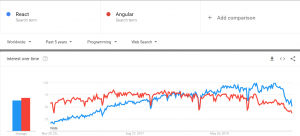
Source: Google Trends
MERN stack is ideal for the faster and more rapid development of smaller applications. When compared to the MEAN stack which is excellent for large-scale applications. It has wide applicability in the tech sector. It is emerging as a one-stop solution for app development, thanks to its array of advantages. The advantages include faster code development, simplification of UI rendering, and unidirectional data flow that gives a better data overview. MERN stack development can help individuals earn an average of INR 5.8 LPA, according to GUVI’s recruitment cell. The student getting placed via GUVI’s career program has received job offers with salaries as high as 21 LPA.
MEAN vs MERN: Who Should Choose What?
MEAN and MERN is taking the tech world by storm and are high in demand, especially in the startup sector. However, choosing a full-stack option that’s best for you requires a thorough analysis of your previous qualifications and your overall goals. The MERN stack, however, is emerging as a more reliable and versatile framework that is suitable for front-end development. And since it is JavaScript-based, the apps are lightweight and easy to build and modify.
Developers and coding enthusiasts
Programmers or students who already working in the IT sector, service companies, or who have worked on developing websites & applications in college can benefit greatly from full-stack development, especially MERN stack, as it provides and equips them with the necessary tools to create efficient web applications with less effort, time and by simplifying the entire development process significantly. MERN’s ability to offer end-to-end frameworks for developers makes it the ideal choice for Front End, back-end Developers to evolve into Full Stack Developers.
Engineering Graduates:
Engineers who know basic programming, essentially freshers looking for career-building opportunities in the IT sector or looking for opportunities to shift can benefit from the MERN stack, as it is easy to work with and involves only one simple language consistently throughout the development. This makes it easier for learners as the language-level complexities are almost gone. And we’ve seen students become Full Stack Developers within 90 days.
New to coding and non-programmers
Students belonging to backgrounds such as science and business are also learning full-stack development. This is simply because of its fast-growing career opportunities. Adding to MERN’s wide applicability is the fact that it uses JavaScript. A single language uncomplicates the learning process, making it more accessible to non-programmers. Having a learning orientation and niche in the tech industry can help individuals from non-technical backgrounds understand their respective fields better. And the MERN stack is one of the most effective ways to do so.
MEAN vs MERN: How long does it take to learn?
A typical full-stack development program can stretch between 4-9 months. Given the Covid scenario, every organization’s focus has jumped to productivity. Hence the demand for Full Stack Developers has shot up. Expecting the demand, GUVI’s career program is designed to help you master Full Stack Development in about 8 weeks in total. It is with an additional 4 weeks for real-time projects for practical exposure and getting students ready to step into the tech world.
Above all, the span of the first two months of the course teaches you the basics of front-end development, back-end development, data structures and scalability, and portfolio building. In addition to the continuous mentor support, online classes bring in stupendous learning about full-stack development. These tutoring sessions by industry experts from the top global product companies ensure that you get the right exposure.
Wrapping Up on MEAN vs. MERN
Hope this answered all your questions on MEAN vs. MERN Stack Development. If you have any more queries, please drop a comment right below and we would love to answer all the queries.
You can get started with your Full Stack Development journey by enrolling in GUVI’s certified Full Stack Development Course with placement assistance where you will master the MERN stack (MongoDB, Express.js, React, Node.js) and build interesting real-life projects. This program is crafted by our team of experts to help you upskill and assist you in placements. Alternatively, if you want to explore JavaScript through a Self-Paced course, try GUVI’s JavaScript course.






















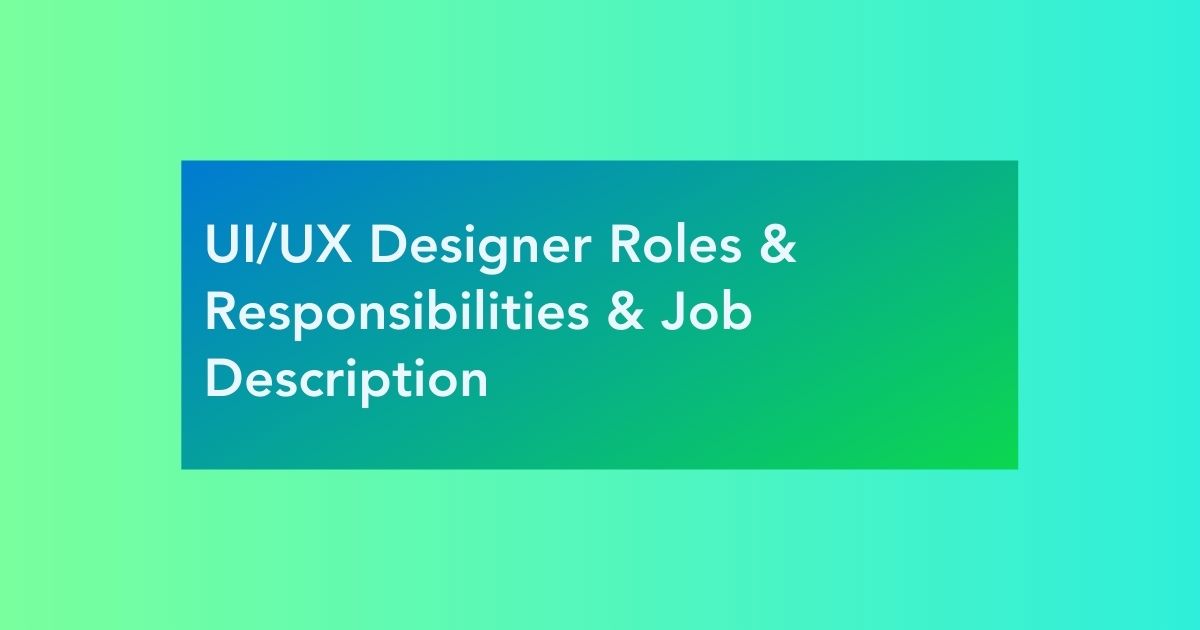
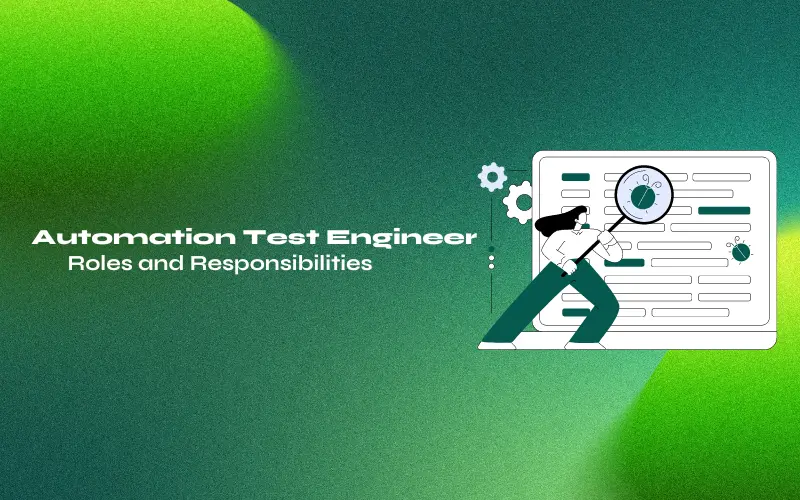
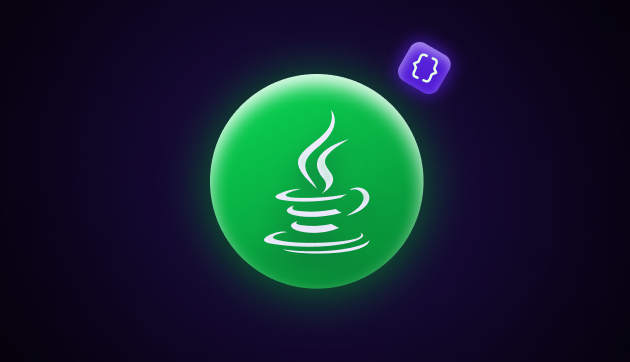
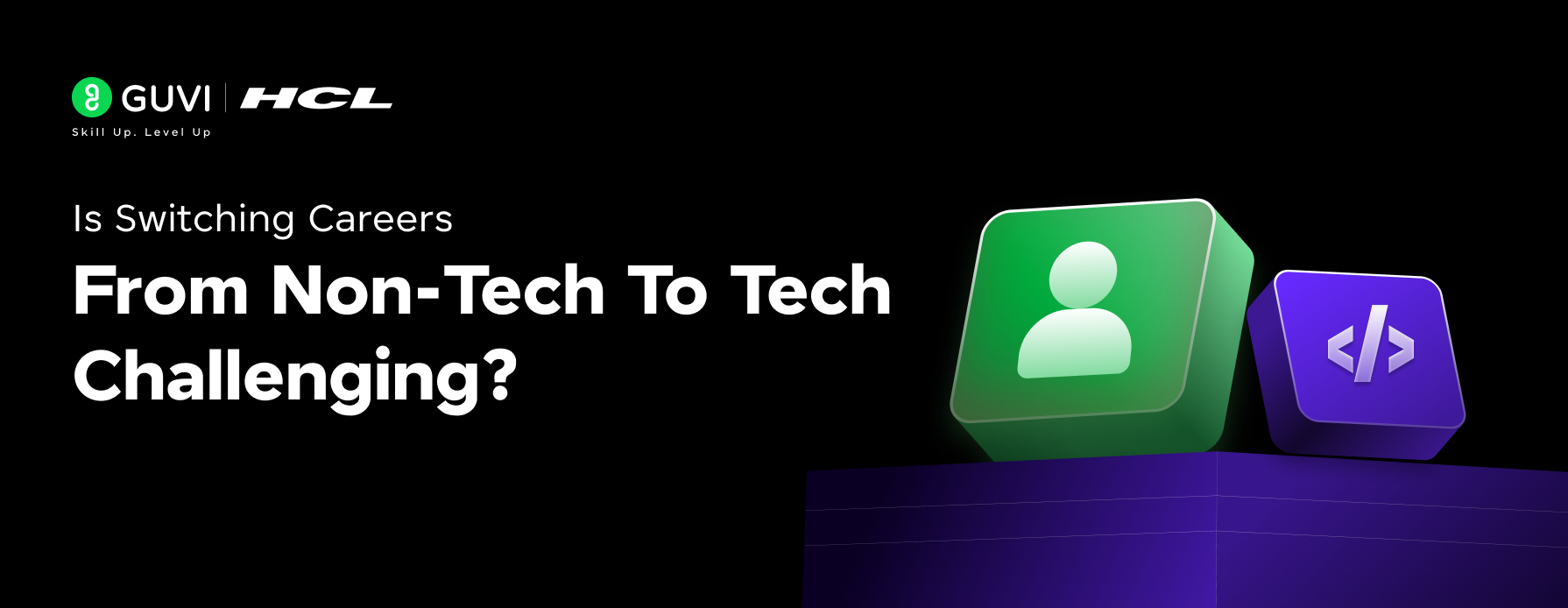





Did you enjoy this article?